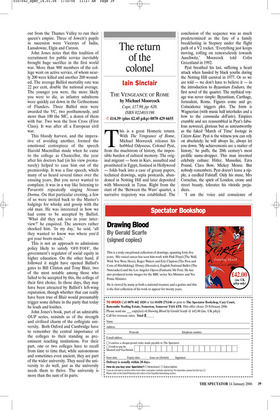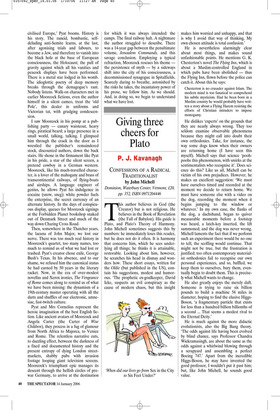The return of the colonel
Iain Sinclair
THE VENGEANCE OF ROME by Michael Moorcock Cape, £17.99, pp. 620, ISBN 0224031198 ✆ £14.39 (plus £2.45 p&p) 0870 429 6655 This is a great Homeric return. With The Vengeance of Rome, Michael Moorcock releases his hobbled Odysseus, Colonel Pyat, from the maelstrom of history, the impossible burden of cultural memory. The original migrant — born in Kiev, assaulted and prostituted in Egypt, lionised in Hollywood — folds back into a case of greasy papers, technical drawings, sepia postcards, abandoned in Notting Hill and later deposited with Moorcock in Texas. Right from the start of the ‘Between the Wars’ quartet, a narrative trajectory was established. The conclusion of the sequence was as much predetermined as the fate of a family breakfasting in Stepney under the flight path of a V2 rocket. ‘Everything just keeps moving, rolling on remorselessly towards Auschwitz,’ Moorcock told Colin Greenland in 1992.
Pyat breathed his last, suffering a heart attack when hassled by black youths during the Notting Hill carnival in 1977. Or so we are told — we don’t have to believe it — in the introduction to Byzantium Endures, the first novel of the quartet. The mythical voyage was never simple: Byzantium, Carthage, Jerusalem, Rome. Figures come and go. Coincidence triggers plot. The form is Wagnerian (with music hall interludes and a bow to the commedia dell’arte). Empires crumble and are reassembled in Pyat’s fabulous newsreel, glorious but as untrustworthy as the faked ‘March of Time’ footage in Citizen Kane. Pyat is the witness you can rely on absolutely; he will always lie, always let you down. ‘My achievements are a matter of history,’ he puffs, the 20th century’s most prolific name-dropper. This man invented celebrity culture: Hitler, Mussolini, Ezra Pound, Clara Bow, Mickey Mouse. But nobody remembers. Pyat doesn’t leave a ripple, a curdled Falstaff. Only his muse, Mrs Cornelius, the spirit of London, crone and street beauty, tolerates his vitriolic prejudices.
‘I am the voice and conscience of civilised Europe,’ Pyat booms. History is his story. The rancid, bombastic, selfdeluding anti-Semite learns, at the last, after agonising trials and labours, to become a Jew, and therefore to vanish into the black hole at the base of European consciousness, the Holocaust; the pull of gravity against which all his vanities and peacock displays have been performed. There is a metal star lodged in his womb. The idioglottic poetry of deep memory breaks through the demagogue’s rant. Nobody listens. Walk-on characters met in earlier Moorcock fictions, even the author himself in a silent cameo, treat the ‘old Pole’, this dealer in uniforms and Victorian tat, with grudging condescension.
I saw Moorcock in his pomp at a publishing party — canary waistcoat, heavy rings, piratical beard; a large presence in a small world, talking, talking. I glimpsed him through the crack in the door as I wrestled the publisher’s remaindered stock, discounted authors, down the back stairs. He shone in the firmament like Pyat in his pride, a star of the silent screen, a pretend cowboy in a German western. Moorcock, like his much-travelled character, is a lover of the mahogany and brass of transcontinental railways, of flying-boats and airships. A language engineer of genius, he allows Pyat his indulgence in cocaine (snow, sneg): white powder fuels the enterprise, the secret currency of an alternate history. In the days of conspicuous display, queues for Moorcock signings at the Forbidden Planet bookshop snaked out of Denmark Street and much of the way down Charing Cross Road.
Then, somewhere in the Thatcher years, the lacuna of John Major, we lost our nerve. There was too much real history in Moorcock’s quartet, too many names, too much to remind us of what we had lost or trashed. Pyat’s creator chose exile, George Bush’s Texas. In his absence, and to our shame, we refused him the canonical status he had earned by 50 years in the literary racket. Now, in the era of over-modest novellas and Xerox ironies, The Vengeance of Rome comes along to remind us of what we have been missing: the dynamism of a 19th-century master operating with all the darts and shuffles of our electronic, amnesiac, fast-twitch culture.
Pyat and Mrs Cornelius represent the heroic imagination of the best English fiction. Like ancient avatars of Moorcock and Angela Carter (the Carter of Wise Children), they process in a fug of glamour from North Africa to Majorca, to Venice and Rome. The relentless narrative cuts, to dazzling effect, between the darkness of a fixed and documented history and the present entropy of dying London streetmarkets, shabby pubs with invasion footage looping giant television screens. Moorcock’s triumphant epic manages its descent through the hellish circles of prewar Germany, to arrive at the destination for which it was always intended: the camps. The final railway halt. A nightmare the author struggled to describe. There was a 14-year gap between the penultimate volume, Jerusalem Commands, and this savage conclusion. Employing a typical refraction, Moorcock rescues his theme the persistence of myth — by a sideways shift into the city of his consciousness, a decommissioned synagogue in Spitalfields. Scarcely daring to breathe, astonished by the risks he takes, the incantatory power of his prose, we follow him. As we should. And, in doing so, we begin to understand what we have lost.















































 Previous page
Previous page